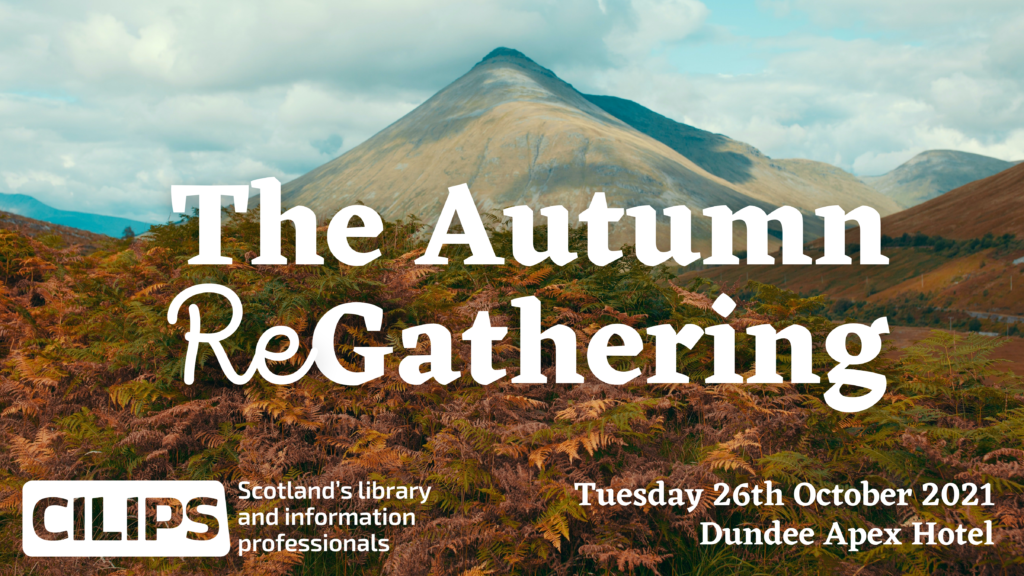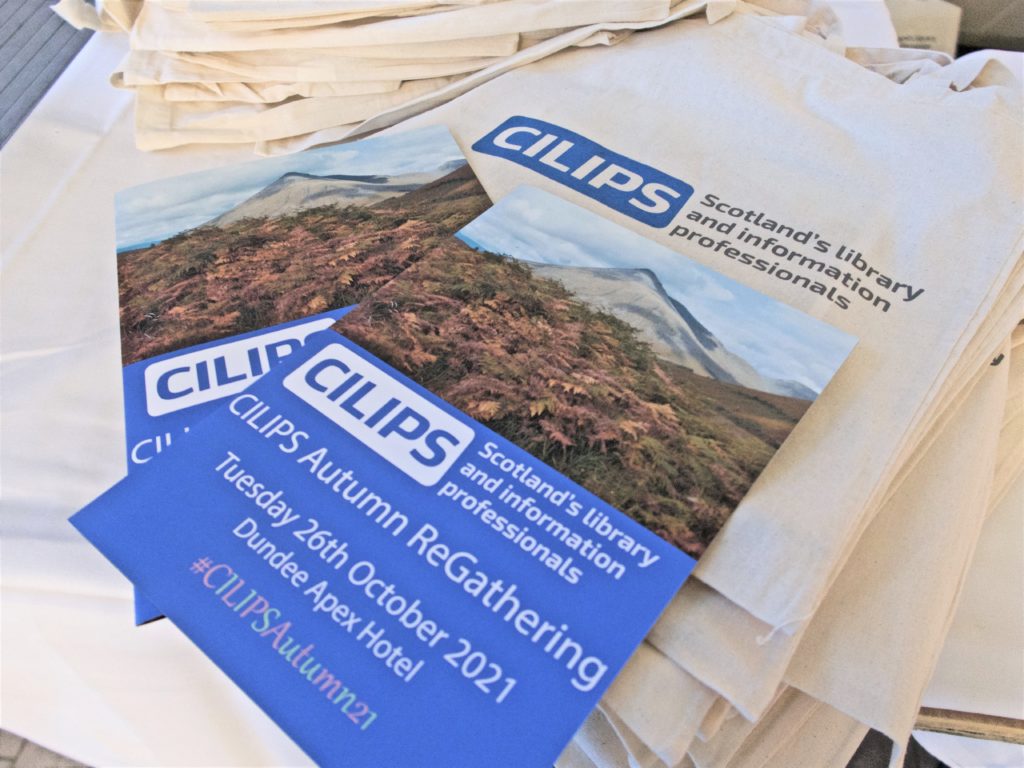The CILIPS Autumn ReGathering – Adeline Tournier and Sarah Docherty, City of Glasgow College Libraries
Category: Blog, Professional Development
by Adeline Tournier and Sarah Docherty, Information Assistants at City of Glasgow College Libraries.
Media and Information Literacy: our biggest challenge and opportunity
Dr Jane Secker, Chair of CILIP Information Literacy Group
Firstly, the definition of information literacy was explored, with a variety of viewpoints. Why information literacy is important was similarly discussed. Both were agreed, should be shouted from the rooftops! In that they are at the core of lifelong learning. It is to seek, evaluate, use and create information effectively to achieve. It is a basic human right in a digital world and it promotes social inclusion.
The Media and Information Literacy Alliance (MILA) has developed a framework based in five contexts; health, education, workplace, democracy and everyday life – to highlight the diverse nature of IL which encompasses our everyday life. This has been particularly pertinent in recent times as the pandemic introduces a plethora of information which is overwhelming to many if not most people. How to navigate such information and what to take from it goes hand in hand with information literacy and demonstrates how such can make a marked difference in people’s lives. There exist 5 key aspirations of the framework: to be connected, socially conscious, be healthy and empowered and be informed. We think the framework pulls together how vital information literacy is and sets noble aspirations which library staff can be at the forefront of.
‘Maddie is Online’: digital literacy in young people
Dr Konstantina Martzoukou, Emma Grey, Niall MacDonald and Ioannis Panayiotakis, Robert Gordon University
The team from Robert Gordon University came up with an exciting and original initiative to make children and young people more information-literate. This is the ‘Maddie is Online’ project.
With one in three Internet user being a child, and a fifth of them facing online harm at some point, the need to introduce information literacy at a young age is now more acute than ever. According to Konstantina, as many as 80% of children are estimated unable to ‘judge the credibility of information’. Peer-pressure amongst young people can also lead to online harm. As a result, young people need guidance, and this guidance needs to be conveyed in a means adapted to them. This is what ‘Maddie is Online’ is intended for. Konstantina’s definition for the ‘Maddie is Online’ project is a ‘cartoon-based resource for schools’.
The episodes of the cartoon are organised in different themes revolving around information literacy online. They are meant to be used in a high school setting, and a team of interns at RGU have also helped to develop the episodes along with printed booklets containing activities and lesson plans. These resources are designed to explore information literacy further in the classroom. The RGU team also visited schools across Scotland to collect feedback on the project. The main goal was to open up a dialogue with children regarding ‘Maddie is Online’.
This need to promote information literacy also applies to slightly older cohorts of students, so we believe a similar project, adapted to young adults, could be relevant in a further education context. This could be something we may consider trying in COGC libraries.
Climate Action, Inequalities and Knowledge
Lydia Ayame Hiraide and Sophie Robinson, student researchers
In the first part of this talk, Lydia reminded us of the goals of the Paris Agreement on climate change signed in 2015, in which it was agreed that the emissions of harmful gases should be limited so the global temperature rise would be limited to 1.5ºC-2ºC at the maximum. One of the best places to raise awareness about environmental concerns is in libraries. In Lydia’s words, libraries are ‘collaborating and empowering spaces’ because they are community hubs where public conversation and debate can happen. Lydia took the example of the British Library, which has created a ‘Story Garden’ accessible to the public. This project is a way to reach out to people about environmental issues. This goes on to show that nowadays, libraries are so much more further-reaching than just providing knowledge from books. Library collections can take many different forms.
In the second part of the talk, Sophie explained to us how climate change impacts on women’s lives in particular and how it can exacerbate existing gender inequalities. Women and girls represent over 70% of the poorest people on the planet, and as such, are likely to be the most impacted by climate change. Yet, they are severely underrepresented in the debates about climate change. For example, a vast majority of the COP21 delegates and representatives were white men, and this is likely to be the same for COP26. Sophie pointed out that in the fight against global warming, everyone needs to be involved, and she also said that there is not ‘a one-size-fits-all approach to the climate crisis’, so all people should be represented. She also reminded us of the vital part played by the Glasgow Women’s Library – the only museum and archive exclusively dedicated to women in the UK – as a place where women’s knowledge and experiences are validated.
Virtually Together: innovation in public libraries
Scott Simpson, Lynsey Ng and Margaret Fox, East Renfrewshire Libraries
The fun element of this technology was apparent as the virtual reality tech was demonstrated. Looking at increasing engagement in libraries, especially maybe with those more hesitant to join in. The project utilised several apps, and Wander which was based on Google Earth was particularly interesting as the world was your oyster, as long as the wee Google van had taken a picture of it. Initially games are used to get users more comfortable with the sensation and the controls. Games were very successful. We could definitely see the draw of virtual technology within a library setting as it helps tackle inequality of access and provides a starting point to explore that may never have been conceived of. A fascinating project. We think virtual reality would appeal to college aged students perhaps for specific projects that may tie in with their classes or maybe completely for fun, relaxation and wellbeing.
‘Information Professionals Can Wear Many Hats!’ Employability Workshop
Ania Matuszewska, NHS Lanarkshire
Rather than different hats, the talk really asks you to think of it as one big hat encompassing many library positions and many more when transferrable skills are taken into account. The talk started with a call to not focus on what one is not, rather to focus on what you actually are. Movement within the different branches of library professionals seems to be particularly difficult, with some exceptions within the conference audience, having experience of many different types of libraries. However, the main focus was on transferrable skills which were felt to be relevant to many different careers outwith the library profession.
The good news is that for most people starting a career as library and information professionals, skills are transferrable and constitute an asset in a job application. Yet, they need to be supported, which is just what Chloe and Elizabeth provide. They both volunteer for the Students and New Professionals Community (SNPC). This platform offers advice and a support network. Information about new job openings is shared and events are organised to support new professionals.
Stories and Slides: Ideas from a school librarian
Stephen Leitch, Buckie Community High School and Keith, Grammar School Librarian
This session was thoroughly engaging. School librarian Stephen Leitch talked us through the digital tools he had used to make resources for his pupils both primary and secondary. Creating ‘Choice Boards’ links were imbedded within the graphics on the board. Stephen had also created a caricature of himself that appeared on library materials, which led to the children recognising the guy from the library, and as Stephen said, it created a bit of a library brand. There is an additional needs unit at one of Stephen’s schools and it was identified that perhaps they were not getting the most use of the school library or librarian. This was tackled by resource creation around particular stories, e.g. Monkey Puzzle. Stuffed animals, which moved, crinkled or made noise or maybe just looked particularly fierce were interspersed with tooters and horns, squeaky pigs and finger pianos. Stories come to life from within the story box, as a collection of about 10 different stories were developed. Stephen illustrated how interactive and inclusive his story boxes were, by handing out examples he had kindly taken with him. The room immediately become noisy, with laughter and engagement. It was apparent how infectious such classes were and whilst we are not sure that we could learn from this for our students… on the other hand it very quickly demonstrated what great engagement is – never a lesson to be overlooked. His choice boards with embedded links could be assessed in hope of being adapted to an older age cohort. We would say that many additional need units or schools could benefit from some of Stephen’s magic!
AI and the Information Professional
Dr Andrew Cox, Information School, University of Sheffield
The last talk of the day was delivered by Andrew who told us how artificial intelligence could impact information professionals, as well as the opportunities and concerns it raises. Like many others, the role of information professionals will most certainly be gradually transformed by AI. Thanks to robotic process automation, the job could be simplified, but we do not as yet fully grasp the real potential of AI. Andrew wonders how much of the potential we attribute to AI is actually part of a ‘social imaginary’. Although the possibilities seem endless, AI also presents issues such as sustainability because of the energy it consumes, security, privacy, the manipulation and storage of data, ethics, and potentially new forms of inequalities.
Overall, the conference was an interesting mix of topics pertinent to libraries today. The talks were engaging, and it was definitely nice to see people face to face. The venue was fantastic, as was the food and staff. Thank you CILIPS for putting on a thought provoking programme and providing inspirational presenters.
Thank you so much Adeline and Sarah for sharing such thoughtful reflections and learnings from the Autumn ReGathering. We’re glad you were able to join us and hope to see you at another CILIPS event soon!

